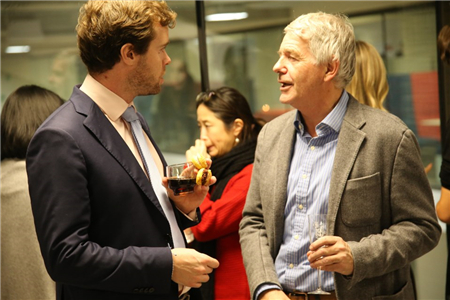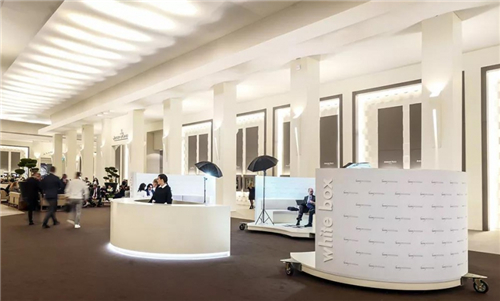 瑞士校园动态新鲜事01.18
瑞士校园动态新鲜事01.18
瑞士主流私立学校 校园动态01.18 莱蒙国际学校——综合教育的优势 选取学校的依据: When choosing an international school parents are confronted with a wide range of choices, many with exceptional academic reputations. It is the additional offerings; impressive art and sport programmes, inclusive extracurricular activities, methods to instil autonomy and enhance soft skills and the understanding of each child’s uniqueness that set institutions apart. At Collège du Léman we believe that a balanced education is vital, and at each and every level of the school, this balance is in practice. 当家长为孩子选择一所海外的国际学校就读时,会面临一系列的判断与决策,一所学校如若拥有卓越的学术成就和不凡的悠久名声,还配有各种兴趣社团和户外活动,定能提供给学生更多的教学帮助和成长支持。一流的课外文化之旅,可以培养学生自主学习的意识,提升学术软实力。对每名学子的因材施教,更会成为很多家长的心仪之选。因此,在瑞士日内瓦的莱蒙国际学校,一直坚信并实行的综合教育理念,是至关重要的,各年级的师生们也正在积极贯彻之中。 Our community is composed of families from all over the world. We embrace the fundamental values of Respect, Internationalism, team Spirit and Excellence and educate our students to be principled, open-minded, inquisitive, engaged and responsible through a balanced education as they prepare for global citizenship. RISE精神: 莱蒙国际学校的学生来自全世界不同的国家和家庭。本学校所倡导的基本价值观就是RISE:尊重(Respect)、国际化(Internationalism)、团队精神(Team Spirit)和追求卓越(Excellence)。教育我们的学生成为一名有准则、开明、勤学好问的学子。通过全面教育让他们在成为全球公民的进程中肩负起责任。 Our academic balance Our curriculum provides an exceptional set of learning opportunities. Students learn through English, French or the Bilingual programme from preschool upwards, as they work towards a variety of diplomas; the highly-regarded International Baccalaureate, the Swiss Maturité, the American High School diploma or the French Baccalaureate.At Collège du Léman we pride ourselves on our academic reputation, high quality teaching staff and excellent exam results. However, we also have world-class programmes in music, dance and sport as well as over 80 other extracurricular activities. Great emphasis is placed on pastoral care and we provide a tailor-made pathway for our students. At each stage of their school life they will be able to select courses and activities that inspire them, both inside and outside the classroom. 学术平衡: 我们的课程会营造出很多学习机会,学生们从幼儿园起学习英语、法语或者双语,这一语言环境可以一直延续到大学之前,每个在读学生都可以取得符合自己未来志向的毕业证书。在莱蒙国际学校我们对取得的学术成就和优异的考试成绩感到自豪,这还要归功于高质量的师资水平。我们学校还有世界级的音乐选修项目(美国茱莉亚音乐学院协同授课)、舞蹈和体育等80余项课内外的专长活动,我们为学生提供了一个量身定制的途径,在他们学生生涯的每个阶段,都能够选择自己喜欢的校内课程和课外活动,使学生们收获无限灵感和充分启迪。 Location and sport Our location close to Geneva means that we are within easy reach of both the city and the mountains, and can provide a wide variety of sports and activities for our students such as skiing in the winter, and horse riding as the snow thaws.Our state-of-the-art sports facilities provide a top-class home for games and events on campus. Collège du Léman is well known locally for its successful Panthers basketball team, and our girls’ soccer team has secured recent national titles. The school maintains links with a number of local associations, including Club Nautique de Versoix. Other sports on offer include badminton, judo, track and field, and rugby. 地理位置和体育活动: 学校的位置离日内瓦市区很近,这就意味着学生可同时领略到城市与山川的两种景色,莱蒙提供各种各样的体育活动,比如:冬天滑雪、天气回暖可后进行马术、高尔夫、帆船。学校设施先进的州立艺体馆作为一个出色的场地,可以在校园内举行任何的体育赛事和主题活动。莱蒙国际学校有一支享誉盛名的篮球队,学校的女子足球队在最近一次的比赛中获得国家级的荣誉头衔。学校的登山队与许多当地户外爱好者协会建立起合作关系,比如:Nautique de Versoix俱乐部灯。学校同样还开设有羽毛球、柔道、田径和橄榄球等运动俱乐部。 The arts and the Julliard School Reaffirming that unlocking your childs potential isnt just about academics, our international school offers a broad programme of music, dance, drama and art, encouraging students to be creative, confident, disciplined and inventive.Along with painting and illustration, each child is encouraged to pick up an instrument and discover singing and dance from an early age. As they get older, they have the opportunity to explore their own musical passions and discover how to perform both individually and as a group. Our dance classes range from classical and ballet to more modern styles such as hip-hop.Our dedication to the arts has been further enhanced by our collaboration with the Juilliard School in New York, a leader in performing arts education, aligning with their programme of arts education to all students in the local community. 艺术与茱莉亚音乐学院: 重新认识孩子才能和发掘他们的潜力不仅仅只是在学业上,莱蒙国际学校还能提供给学生广阔的音乐、舞蹈、戏剧和美术平台,鼓励学生发挥创造力、提升自信心、纪律性和实践能力。无论是绘画还是其他才艺展示,学校鼓励每个孩子拿起他们手中的绘画工具或乐器,当学生还处在幼儿时就及时发现他们的天赋。随着年龄的增长,他们的才艺将逐渐增长,对相关学科的热情也与日俱增,他们可以个人或集体的形式来展示出各自的才能。我们的舞蹈课程适应从经典舞、芭蕾舞直到现代风格的各种舞蹈,比如:嘻哈、街舞等。在未来的发展过程中,学校还会继续加强同纽约茱莉亚音乐学院的合作,茱莉亚音乐学院是音乐教育里的领军者,在莱蒙国际学校教授的音乐课程与纽约总校的音乐教育大纲没有任何的差异。 Charities and community work Children at Collège du Léman have the opportunity to sign up for fundraising activities, community initiatives and awareness campaigns. Through strong encouragement and ongoing support, our students find charitable work that appeals to their individual interests. We have many different projects to choose from including local initiatives and environmental action to the Christmas Gift Box appeal that benefits orphans across Eastern Europe and collaborations with village school-building charities in Tanzania and Zambia. 慈善、社区服务: 在莱蒙读书的学生都有机会参加慈善基金的活动,学校内定期举办的慈善义捐和其他慈善宣传。通过积极鼓励和持续开展的慈善活动,学生能对慈善公益产生浓烈的兴趣和关注度。学校里有很多项目可以让学生自愿选择,包括当地的公益倡议和组织环境保护活动,去东欧给孤儿送去圣诞礼物,以及与坦桑尼亚和赞比亚的乡村学校建立牢固的慈善合作。 博索雷学院新鲜动态: 博索雷学院很高兴经过一个圣诞假期的时光后,迎来全体学生返回学校,也相信所有学生都很享受与家人、朋友在一起的假期时光。经过一个圣诞假期的整理,这是上学期末的一些庆祝活动、表演活动的照片。照片呈现出所有演出者、音乐家和相关教职员工们最出色的一面,这是一场高质量演出,以下是这次演出的精选照片: 该文章为搜瑞士原创文章,如需转载,敬请注明出处。 Sooswiss为您提供 瑞士方向私人管家式的定制服务: 1)家族传承 2)财富管理 3)瑞士投资 4)居留计划 5)税务优化 6)家族治理 更多资讯请登录网站 www.sooswiss.com
 How the 0.001% invest十万分之一的人群怎样投资
How the 0.001% invest十万分之一的人群怎样投资
How the 0.001% invest 十万分之一的人群怎样投资 Investing and the super-rich 投资与超高净值人群 Think of the upper echelons of the money-management business, and the image that springs to mind is of fusty private banks in Geneva or London’s Mayfair, with marble lobbies and fake country-house meeting-rooms designed to make their super-rich clients feel at home. But that picture is out of date. A more accurate one would feature hundreds of glassy private offices in California and Singapore that invest in Canadian bonds, European property and Chinese startups—and whose gilded patrons are sleepwalking into a political storm. 想象一下财富管理业务的最高层:我们幻想他们应该端坐在日内瓦或伦敦梅菲尔的私人银行里,置身于大理石厅堂和乡村风格的会议室之中,旨在让其所服务的超级富豪们宾至如归。但这样的印象已经过时了,当下的场景是:位于加利福尼亚和新加坡的数百家玻璃幕墙的私人办公室里,投资向加拿大债券、欧洲房地产和中国的创业公司——背后镀金的老板们则在一场场政治风暴中穿梭。 Global finance is being transformed as billionaires get richer and cut out the middlemen by creating their own “family offices”, personal investment firms that roam global markets looking for opportunities. Largely unnoticed, family offices have become a force in investing, with up to $4trn of assets—more than hedge funds and equivalent to 6% of the value of the world’s stockmarkets. As they grow even bigger in an era of populism, family offices are destined to face uncomfortable questions about how they concentrate power and feed inequality. 全球金融正在转变,因为亿万富翁们变得更加富裕,并通过创建自己的“家族办公室”来切断中间商,这些个人投资公司漫游在全球市场内寻求机会。家族办公室虽还未受到广泛关注,却已成为投资的中坚力量,投资总额高达4万亿美元,超过对冲基金,等同于全球股票市场价值的6%。但是,伴随当下民族主义浪潮日渐壮大的家族办公室,却注定无法回避如何集中权力、处理财富不均这样的尴尬难题。 The concept is hardly new; John D. Rockefeller set up his family office in 1882. But the number has exploded this century. Somewhere between 5,000 and 10,000 are based in America and Europe and in Asian hubs such as Singapore and Hong Kong. Though their main task is to manage financial assets, the biggest offices, some with hundreds of staff, undertake all sorts of other chores, from tax and legal work to acting as high-powered butlers who book jets and pamper pets. “家族办公室”的概念并不新鲜;约翰·D·洛克菲勒早在1882年已成立他的家族办公室。但这个数字在本世纪爆发了:介于5,000到10,000个之间的家族办公室,广泛分布于美国、欧洲以及亚洲的中心(如新加坡和香港)。虽然其主要任务是管理金融资产,但在拥有数百名员工的最大型家族办公室里事务可谓极其繁多:从税务到法务,甚至是预订私人飞机和照顾萌宠的高级管家。 The costs of bringing such expertise in-mansion means that they generally make sense only for those worth over $100m, the top 0.001% of the global pile. Asian tycoons such as Jack Ma of Alibaba have created their own fiefs. The largest Western family offices, such as the one set up by George Soros, an investor and philanthropist, oversee tens of billions and are as muscular as Wall Street firms, competing with banks and private-equity groups to buy whole companies. 组建这种专家团队的成本,通常只对那些价值超过1亿美元的客户才有意义,这里讲的是全球最高净值的0.001%人群。像阿里巴巴的马云这样的亚洲大亨早已创建了自己的封地。最大的西方家族办公室,例如投资者和慈善家乔治·索罗斯(George Soros)所设立的家族办公室管理着数百亿美元,已经与彪悍的华尔街公司无异,可与银行和私募股权集团分庭抗礼,去收购大公司。 Every investment boom reflects the society that spawned it. The humble mutual fund came of age in the 1970s after two decades of middle-class prosperity in America. The rise of family offices reflects soaring inequality. Since 1980 the share of the world’s wealth owned by the top 0.01% has risen from 3% to 8%. As the founders of family firms receive dividends or the proceeds of initial public offerings, they usually redeploy the cash. But since the financial crisis there has been a loss of faith in external money managers. Rich clients have taken a closer look at private banks’ high fees and murky incentives, and balked. 每一次投资热潮都反映了催生它的社会现状。在美国经历了20年的中产阶级繁荣之后,1970年代诞生了低调的共同基金。家族办公室的崛起反映了财富不均现象的飙升。自1980年以来,由0.01%的最高净值人群所拥有的世界财富份额已从3%上升到8%。由于家族企业的创始人获得股息或首次公开募股的收益,他们通常会重新部署现金。但经过金融危机,他们对外部的理财经理的信心已丧失殆尽。在高额的私人银行费用和不显著的激励措施之下,这些富人们踌躇不前。 These trends are unlikely to fade, as our Briefing explains. The number of billionaires is still growing—199 newbies made the grade last year. In the emerging world older entrepreneurs who created firms in the boom years after 1990 are preparing to cash out, while in America and China younger tech entrepreneurs may soon float their companies, releasing a new wave of cash to reinvest. Family offices’ weight in the financial system, therefore, looks likely to rise further. As it does, the objections to them will rise exponentially. The most obvious of these is the least convincing—that family offices have created inequality. They are a consequence, not its cause. Nonetheless, there are concerns—and one in particular that is worth worrying about. 正如我们的简报所解释,这些趋势不太可能消退。亿万富翁的数量仍在增长——去年一年世界新增了199位亿万富翁。在新兴世界,1990年以后繁荣时期创建公司的老企业家们正在准备兑现,而在美国和中国,年轻的科技界企业家的公司市值可能会很快浮升,释放出新的现金再投资。因此,家族办公室在金融系统中的重要性可能会进一步地提高。事实上,对家族办公室的反对声也必将甚嚣尘上。最大的反对声其实并不具说服力:他们说家族办公室造成了贫富不均。但这只是结果,而非成因。尽管如此,家族办公室还是存在着一些隐忧问题,最突出的如下: The first is that family offices could endanger the stability of the financial system. Combining very rich people, opacity and markets can be explosive. ltcm, a $100bn hedge fund backed by the super-rich, blew up in 1998, almost bringing down Wall Street. Scores of wealthy people fell for a Ponzi scheme run by Bernie Madoff that collapsed in 2008. Still, as things stand family offices do not look like the next disaster waiting to happen. They have debt equivalent to 17% of their assets, making them among the least leveraged participants in global markets. On balance, they may even be a stabilising influence. Their funds are usually deployed for decades, making them far less vulnerable to panics than banks and many hedge funds. 首先,家族办公室有可能危及金融体系的稳定性。极端富裕人群资产的体量与不透明程度几乎是爆炸性的。Itcm,这家由超级富豪支持的1000亿美元对冲基金,于1998年爆发,几乎压垮了华尔街。 2008年,伯尼·马多夫(Bernie Madoff)经营的庞氏骗局让无数富豪陷入绝境。这些事件倒还没有使家族办公室看起来如同下一场大灾难。家族办公室的债务占其资产的17%,使其成为全球市场中杠杆率最低的参与者。总的来说,家族办公室甚至可能是一股稳定的影响力。他们的资金部署周期长则数十年,比起银行和许多对冲基金更不容易受到恐慌。 The second worry is that family offices could magnify the power of the wealthy over the economy. This is possible: were Bill Gates to invest exclusively in Turkey, he would own 65% of its stockmarket. But the aim is usually to diversify risk, not concentrate power, by taking capital from the original family business and putting it into a widely spread portfolio. The family-office industry is less concentrated than mainstream asset management, which a few firms such as BlackRock dominate. Compared with most fund managers, family offices have welcome habits, including a longer-term horizon and an appetite for startups. 第二个担忧是家族办公室可以放大富人对经济的影响力。这是可能的:如果比尔-盖茨只在土耳其投资,那他将拥有65%的股票市场。但富人们的初衷是:通过原始家族企业获取资金,将其投入多样化的投资组合来分散风险,而不是集中权力。家族办公室投资的行业,其集中程度低于主流资产管理机构,如贝莱德(Black Rock)这样的业内大佬。与大多数基金经理相比,家族办公室的包容性更广,更具长期战略眼光,也更愿意投资创业公司。 It is the third danger that has most bite: that family offices might have privileged access to information, deals and tax schemes, allowing them to outperform ordinary investors. So far there is little evidence for this. The average family office returned 16% in 2017 and 7% in 2016, according to Campden Wealth, a research firm, slightly lagging behind world stockmarkets. Nonetheless, tycoons are well connected. Family offices are becoming more complex—a third have at least two branches—making tax wheezes easier. Hungry brokers and banks are rolling out the red carpet and pitching deals with unlisted firms that are not available to ordinary investors. If all this did lead to an entrenched, unfair advantage, the effect, when compounded over decades, would make wealth inequality disastrously worse. 第三个也是最致命的危险:家族办公室可能有特权获取内幕信息,如交易和税收计划,使他们能够胜过普通投资者。到目前为止,没有太多例证可以证实这一说法。根据研究公司Campden Wealth的数据,2017年平均家族办公室的回报率为16%,2016年为7%,略低于世界股票市场。尽管如此,大亨巨富们之间关系密切。家族办公室也变得越来越复杂——为了使处理税务更容易,三分之一的家族办公室至少设两个分支机构。如饥似渴的经纪人和银行向那些普通投资者无法获知的非上市公司抛出橄榄枝,完成内幕交易。倘若确实因此导致了根深蒂固的不公平优势,那么这种影响在数十年的恶化中,会灾难性地加剧财富不平等。 The rich discover do-it-yourself The answer is vigilance and light. Most regulators, treasuries and tax authorities are beginners when it comes to dealing with family offices, but they need to ensure that rules on insider trading, the equal servicing of ...

 超级富豪的得力助手——家族办公室已成金融大鳄
超级富豪的得力助手——家族办公室已成金融大鳄
 现场报道——2019年 SIHH 日内瓦钟表展(上)
现场报道——2019年 SIHH 日内瓦钟表展(上)
 瑞士校园动态新鲜事01.18
瑞士校园动态新鲜事01.18
 How the 0.001% invest十万分之一的人群怎样投资
How the 0.001% invest十万分之一的人群怎样投资